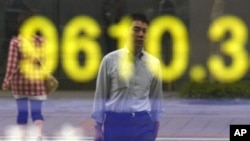Investors in Asia turned pessimistic, Wednesday, reversing gains earlier in the week after U.S. lawmakers reached a debt deal that averted an unprecedented American default.
Share prices fell sharply in the region in the latest trading session, with analysts saying Asian stock exchanges were reacting to renewed worry about the direction of the world’s largest economy.
Major stock markets in Asia dropped, on average, more than two percent. Meanwhile, gold surged to a record high, while the dollar stayed weak, especially against the Japanese yen.
Fresh concern followed Wall Street’s Tuesday declines because of weak U.S. economic reports and poor earnings from several major American corporations.
In South Korea, the benchmark KOSPI closed at 2066 points, a drop of 2.6 percent. In Japan, the Nikkei index finished 207 points lower, some 2.1 percent.
Hong Kong’s Hang Seng index fell more than 428 points, a loss of 1.9 percent. And, in India, the benchmark Sensex hit a six-week low in intra-day trading.
Sean Hwang, who heads equity research at Mirae Asset Securities in Seoul sees a temporary flight to safety among Asian investors continuing for a week or two.
"The sky-rocketing U.S. ten-year Treasuries and gold price shows the risk appetites of investors are really low. For the time being the investors' preference to these kind of safe assets will remain. But the price imbalance between the risky assets and the safe assets are heavily distorted," he said. "So we expect the risky assets' price to recover, sooner or later."
Hwang says investors will realize there is still value in purchasing stocks in some of the emerging markets.
"Compared to the other asset classes, the stock markets, such as [South] Korea and China, appear to be significantly undervalued,” said Hwang.
In Japan there are indications of readiness to intervene in currency markets, with the dollar around 77 yen, nearing a record low in the modern era.
Japanese Finance Minister Yoshihiko Noda is vowing to make “an all-out effort” to prevent a further surge for his country’s currency.
Prime Minister Naoto Kan is also calling the strong yen a source of concern and says Japan has to closely watch foreign exchange markets.
The strong yen threatens to eliminate any economic rebound for Japan, following its devastating March 11th earthquake and tsunami. That fear is being echoed by Bank of Japan Governor Masaaki Shirakawa, who says the yen’s current level could negatively effect the country’s economy, the world’s third largest.
Meanwhile, a little-known Chinese debt rating agency has downgraded the U.S. credit rating.
Dagong Global Credit Rating lowered its rating for U.S. debt from A-plus to A. It says the deal reached in Washington this week will not solve the underlying U.S. debt problems nor improve the country's ability to pay.
The Chinese downgrade is not expected to have much effect on interest rates because the two major rating agencies in the United States have announced they will not immediately be altering America’s top rating.
Chinese Central Bank Governor Zhou Xiachuan is calling on Washington to impose “responsible measures” to manage its debt. In a statement, Zhou warned that volatility in the U.S. bond market could affect the international monetary system’s stability, jeopardizing a global economic recovery.
China is the largest holder of U.S. debt and the world’s second largest economy.




